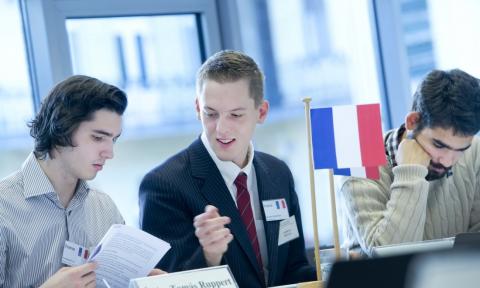Event report – World War I Negotiation Simulation “Re-negotiating Peace”

On October 18-19, 2014, the Center for EU Enlargement Studies of the Central European University, in cooperation with the Friedrich-Ebert-Stiftung Budapest and the Berlin-based Planpolitik, organized a simulation game entitled “Re-negotiating Peace”. Students – interested in history and international relations – coming from various Hungarian universities took roles of world leaders of the early 20th century and negotiated their own version of the Treaty of Versailles and the Treaty of Trianon. They could experience the dynamics of an international negotiation, how important backdoor discussions are, how much effort it takes to achieve small gains and convince the other side when it comes to responsibility, territorial claims, disarmament or reparations. Competing and conflicting interests showed what can really make an agreement possible and how political dynamics define the means and ends of negotiations. After “signing the treaties” students shared their first impressions with each other about the negotiation process and discussed the guiding principles of bargaining that took place among them over the two days.
Students reflect not only just what they have learnt during the game but how they felt.
“The Negotiation game encouraged growth and was facilitated in a wonderful manner. The participants' roles and duties were very well defined and that aided the game's progress. It was my first time in such a game and I would not have imagined it to be so much fun. In the end, we all delved into the psyche of the various individuals and learnt a lot.Thanks for organizing such a wonderful event. I wish we can do it again.” (Shreya Bhattacharya, CEU School of Public Policy)
“Thank you for organizing such an exciting event!It was a great experience, contributing vastly to my historical knowledge as well as to the practical skills of public speaking and negotiation technics. Hope the CEU will host many similar colorful events in the future!” (Anna Nádudvari, Corvinus University Budapest)
"Re-Negotiating Peace" was a great opportunity to develop a more rich understanding of historical events that have shaped the last century and laid the foundation for the formation of the European Union. Active engagement with the material and the ability to "re-consider" history, counterfactual "what-ifs", created a learning environment that fostered critical thinking and a departure from the fallacy of a teleological or fatalistic view of history.“ (Cory Cox, University of Louisville)
“It was the first time that I tried a negotiation simulation game. I found it particularly useful, since I had to make great efforts in order to convince the other participants. I had to use logic, force, and skills of persuasion to achieve the team objectives. The first day was quite exhausting for me, because of the long discussions on some narrow issues, but this taught me that endurance matters a lot in negotiations. On the second day, I was more experienced and I was able to use some of the tactics that I encountered on the first day. One more thing to notice was the importance of informal negotiations, keeping that in mind can come useful in the future. Last, but not least, negotiating in an easy-going atmosphere was quite fun.” (András Tréfás, Corvinus University Budapest)
“Thank you for inviting me, I enjoyed the negotiation exercise a lot! As a lawyer, I am trained to resolve disputes through confrontational methods, i.e. litigation or arbitration, whereas this exercised showed that negotiations in many cases would be an option to achieve a stable win-win situation for both parties. This is especially important in international relations, where every state actor has its own interest and well-being of millions of people is at stake.” (Dmytro Galagan, S.J.D. Candidate at CEU)
For pictures, check out our Facebook page here.
